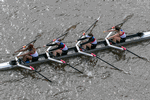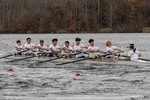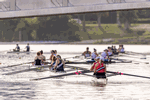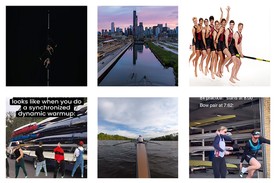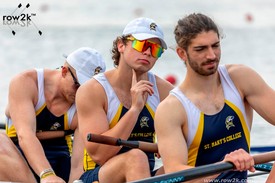Technique & Technology, Part 3: Coaching Influences & Model Crews
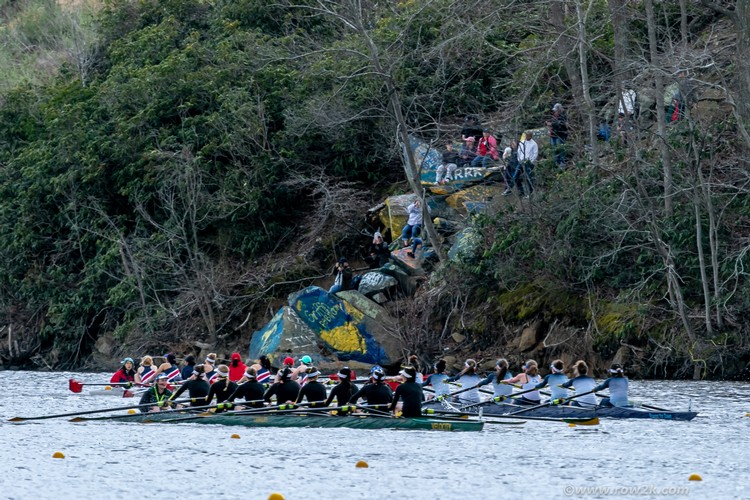
To learn more about this series, see what we plan to cover, and to read Parts 1 and 2 on this topic, please visit the Youth Coaches Corner's index page. Youth coaches are more than welcome to contact row2k to get involved in future columns.
Which coaches have influenced your coaching style and which crews have been the most technically impressive to you and why?
CATHY COFFMAN - ALBEMARLE HS - HEAD COACH
I was fortunate in that I was coached early on by some wonderful, knowledgeable coaches. In high school I was coached by Tom Chisnell, who rowed under Charlie Butt Sr at Washington-Lee HS in the late sixties, and in college at University of Virginia I was coached by Joe Murtaugh who later went on to a very successful career at Princeton with the LWT men.
Both of these coaches drilled into their crews the fundamentals of the stroke. They were always breaking down the stroke into small, manageable pieces and selecting drills to emphasize the portion of the stroke that their crews needed to focus on during a particular practice. As junior coaches, I believe it is of utmost importance to teach our athletes how to row correctly from first days on the water, or the erg for that matter. Break the stroke down for the kids. As a coach, determine what you want to emphasize first. What both Tom and Joe taught me as a rower is that the fundamentals are what is most important--power and speed can't come before the basics.

JAMIE WHALEN - Y QUAD CITIES
I learned a lot by coaching at various sculling camps around the country and watching more experienced coaches do dockside demonstrations in singles. Particularly helpful was the first year I spent coaching with Peter Olrich, Dan Debonis and Alex Machi at the Florida Rowing Center in the early 1990’s. They were excellent at explaining the elements of sculling clearly and concisely. And we had great fun doing the flip/re-entry demonstration a couple times each week.
PARKER WASHBURN - DEERFIELD ACADEMY - WOMEN'S HEAD COACH
My father was my high school coach and I’m still calling him every week for advice! He always brought a certain calmness, steadiness to practice and races which I try to bring to my own coaching. He hardly ever raised his voice and he had a good feel for what the team needed.
My college coach, Harry Parker, was the same way. There was complete belief on the part of their rowers in what we were doing to prepare for races. But I also credit my freshman coach in college, Bill Manning, for shaping how I structure practice. He also was an example of commitment at an important time in my development. He was both teacher and coach, which is something I look to do myself.

LESLEH WRIGHT - TEMPE JUNIOR ROWING - ASSISTANT COACH
So many years, so many coaches. The technical standout would be Christine Wilson, whom I had the pleasure of working with on many occasions but particularly during our time together at Oxford University in preparation for The Boat Race(s). Chris is a student of the sport and she is an outstanding technical coach and rigger.
Technically impressive crews over the years: the Oxford University Women's Boat Club Blue Boat in 2015 and 2016, and the Canadian Women's 8 in 2021.
Other influential coaches have been Scott Anderson, Kris Korzenowski, Neil Campbell, Stan Murdza, Larry Gluckman, Kathy Lichty Boyes, Mike Irwin, Cassandra Cunningham, Lindsay Shoop, Sam and Natasha Townsend, Dragos Aalexandru...this list could be pages upon pages.
ED FELDHEIM - FAIRFIELD PREP - MEN'S HEAD COACH
I was lucky enough to have Bruce Smith as a coach in high school at Loyola Academy. One of the things I remember from him was a willingness to try anything, to see if there was something valuable in a crazy idea. Maybe it worked, maybe it didn't, but you would never know unless you gave it an honest look. I'm always amazed at how much there still is to learn about this sport, so you have to keep trying new things.
As a high school boys eights coach, it is hard to look beyond what St. Paul's (UK) had in 2018 as the ideal (Ed. note: you can watch that Henley Final here). Obviously, they are still doing incredible things with another win in the PE at Henley this year, but that 2018 crew, as we all recognize, was really special. If I'm having the guys watch them I'm pointing out how linear it all is, how little bounce there is in the shell, how relaxed the shoulders and faces are, things like that.

JOHN THORNELL - STONINGTON CREW - WOMEN'S HEAD COACH
Which coaches have influenced my coaching style? All of them! I enjoy talking with other junior coaches and college coaches. I learned this while logging mentoring hours for my USRowing coaching certification.
Different coaches use different approaches. They also have different ways of describing the stroke or boat feel. When college coaches attend our practices, they explain things that we are working on slightly differently, or they see something that I'm not focusing on. It's always helpful.
RICH KESOR - MONTGOMERY BELL ACADEMY - MEN'S HEAD COACH
The stroke that I teach has come more from Valery Kleshnev than anyone else. Being a Physics teacher, I am a very strong believer in quantitative research. How I personally feel about the rowing stroke should not play into what I coach. Therefore, I have looked for what is the most efficient technique for my athletes. Given bigger athletes with more time to devote to training, I might not be teaching the same thing. The most impressive crews to me are the ones at whom you look at on land and think that there is no way they should be in the chips on the water. Yet, they are hanging with crews that are bigger/stronger than they are. Those rowers are doing something better than the rest of us and should be the ones we look at for examples of what to do.
The boats that jump out to me are Ekaterina Karsten in 2012 and the Romanian Women’s 8 in 2004. On paper, neither of them should have stood a chance to make the final or beat the US, respectively. Yet, they went out and moved the boat super efficiently.

REBECCA NEWMAN - WILLIAMSBURG BOAT CLUB - VARSITY COACH
One day in the launch with Kevin Sauer and all of his content over the years through USRowing. He is consistent and his results speak for themselves.
I also appreciate all the coaches that helped with my US Rowing Level 3 Course. I learned so much from them.
RUDY RYBACK - LAKE OSWEGO COMMUNITY ROWING - MEN'S HEAD COACH
At the High School level, I remember watching the Sarasota Men's 8+ at the 2018 Youth Nationals (Lake Natoma) . . . believe Clark Dean was sitting in the 6-seat. There hasn't been a junior rower like Dean, who was single-handily able to change the rhythm of the boat, especially in the last 400m of a race. The precision and accuracy of Dean's sculling was also as good as I've ever seen at the Junior level. The ability to win a National Championship in the 1x and 8+, on the same day, takes quite an engine, but the underrated bit might just be his technical prowess.
On the Junior Women's side, I would say Gordon Getsinger's Saugatuck crews. That Womens 8+ was quite remarkable during those years, and for good reason with Gordon at the helm. We overlapped a bit at my old program, and reunited this year at HOCR. As we launched our respective crews at Friday HOCR practice we stood along the river for half-an-hour and just watched the passing crews. Gordon really has an eye, and the ability to convey technical improvements that I'd never imagined. You can't even put his stuff into a formula!

MATT GRAU - THREE RIVERS ROWING - WOMEN'S HEAD COACH
Learning from and interacting with other coaches is one of the highlights of the job, and one of the easiest ways to become a better coach. I hesitate to mention specific coaches at the risk of forgetting someone who deserves recognition. In my time working within the U19 system I have been lucky to interact with a lot of great coaches.
I am still thinking about how Tom Siddall was coaching posture on the recovery last summer; I enjoyed hearing Casey Galvanek talk about allowing assistant coaches to step into the forefront; I continue to learn a lot about rigging from Eric Gehrke; and Jesse Foglia’s concept of 'easy day/hard day' being a great load management strategy has been in my head since the first time I heard it.
I also think it is important for head coaches to think about what they have learned from their assistant coaches. DJ Civiletti taught me to constantly think about how to improve upon your base team system and plan, Catherine Gellatly showed my the importance of mindfulness and support work, Lindsay Krawczyk has taught me about how to enjoy the time spent with athletes as a culture building tool, and Chris Rickard showed me how to advocate for a squad while still respecting the entire team.
The 2018 and 2019 TRRA Womens Ltwt Youth 2xs showed me what it looks like when your technical approach is fully expressed on the race course, the 2021 TRRA Womens Youth 2x taught me about how powerful a boat with one culture goal can be, and the 2021 TRRA Womens Youth 8+ and 2022 TRRA Womens Youth 2x were both a study in how to find joy even if the end result isn’t what you were hoping for. Finally, I have a number of close friends in rowing who are always willing to look at videos and discuss technique--that is an invaluable resource.

GEORGE KIRSCHBAUM - JUNIORS COACH - AUTHOR OF 'THE DOWN AND DIRTY GUIDE TO COXING'
This is a tough one because, with over 30+ years in the sport, there have been a lot of influences and mentors on my style and the way I coach technique. The obvious was my first coach, Charlie Butt Jr. at Washington-Lee (now Washington-Liberty) High School. Charlie was all about rowing well and trying to be as efficient as possible. My close friend Kevin Harris was the next person to impact my point of view because of the way he taught and what he expected of his athletes. It was never a matter of trying, it was believing and just getting it done. We’ve spent countless hours bouncing ideas off each other. Alan Rosenberg: a single sentence from him spoke volumes. He opened my mind to how to creatively express to an athlete how a given element of technique should look or feel and at the same time make it clear the science behind the idea. Never have I met a coach where the metaphor of “Speak softly and carry a big stick” seemed so true. Lastly, I’d say that two summers in the launch with Steve Peterson and Matt Madigan (2001 and then 2002 respectively) offered me a huge perspective on coaching at the highest level: how to see the finest points of technique and boat flow in the context of selecting boats filled with tremendous athletes, and doing it with honesty and care. All of these coaches were/are about the athletes and their experience more than their own.
To pick just two impressive technical crews, I’d say the ‘96 Dutch Olympic 8+ that many of us have gotten a glimpse of from that grainy VHS video that has floated around for years: their power looked like a paddle. Their flow was easy and smooth, but each drive was an expression of their fitness unleashed. I’ve not seen such precision in body positions or catches. . . just wow.
Personally, my ‘94 PBC flyweight women’s 4+ was probably the best technical crew I’ve coached. Made up of a rising college sophomore, two recent high school grads, and two high schoolers, these young women were tenacious racers who, if you pushed them, pushed back harder. We did a workout that summer emphasizing rhythm and quick connection before Canadian Henley where they rowed at descending rates to a 12 and then back up to a 32, with much of it on the square or ¼ feather. They nailed it. They were never off keel, they connected each stroke and just sent that boat. It was a joy to watch them.

If you enjoy and rely on row2k, we need your help to be able to keep doing all this. Though row2k sometimes looks like a big, outside-funded operation, it mainly runs on enthusiasm and grit. Help us keep it coming, thank you! Learn more.
Comments | Log in to comment |
There are no Comments yet
| |
- Bont Rowing
- Calm Waters Rowing
- Concept 2
- Craftsbury Sculling
- The Crew Classic
- CrewLAB
- Croker
- Dad Vail Regatta
- Durham Boat Co.
- Empacher
- Faster Masters
- Filippi
- Fluidesign
- h2row.net
- HUDSON
- Live2Row Studios
- Nielsen-Kellerman
- Oak Ridge RA
- Peinert Boat Works
- Pocock Racing Shells
- Race1 USA
- Rockland Rowing Masters Regatta
- RowKraft
- Rubini Jewelers
- Vespoli USA
- WinTech Racing
- Bont Rowing
- Calm Waters Rowing
- Concept 2
- Craftsbury Sculling
- The Crew Classic
- CrewLAB
- Croker
- Dad Vail Regatta
- Durham Boat Co.
- Empacher
- Faster Masters
- Filippi
- Fluidesign
- h2row.net
- HUDSON
- Live2Row Studios
- Nielsen-Kellerman
- Oak Ridge RA
- Peinert Boat Works
- Pocock Racing Shells
- Race1 USA
- Rockland Rowing Masters Regatta
- RowKraft
- Rubini Jewelers
- Vespoli USA
- WinTech Racing



